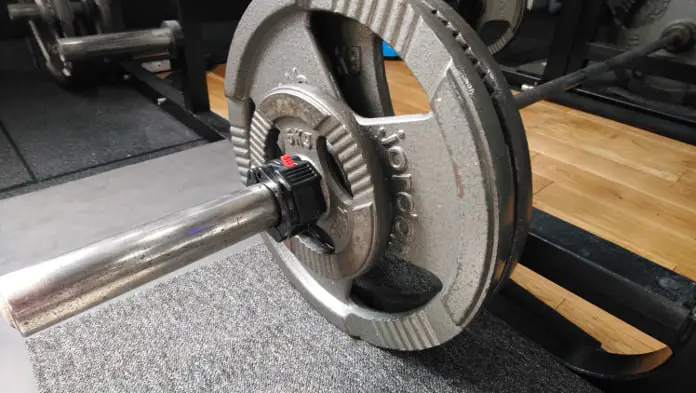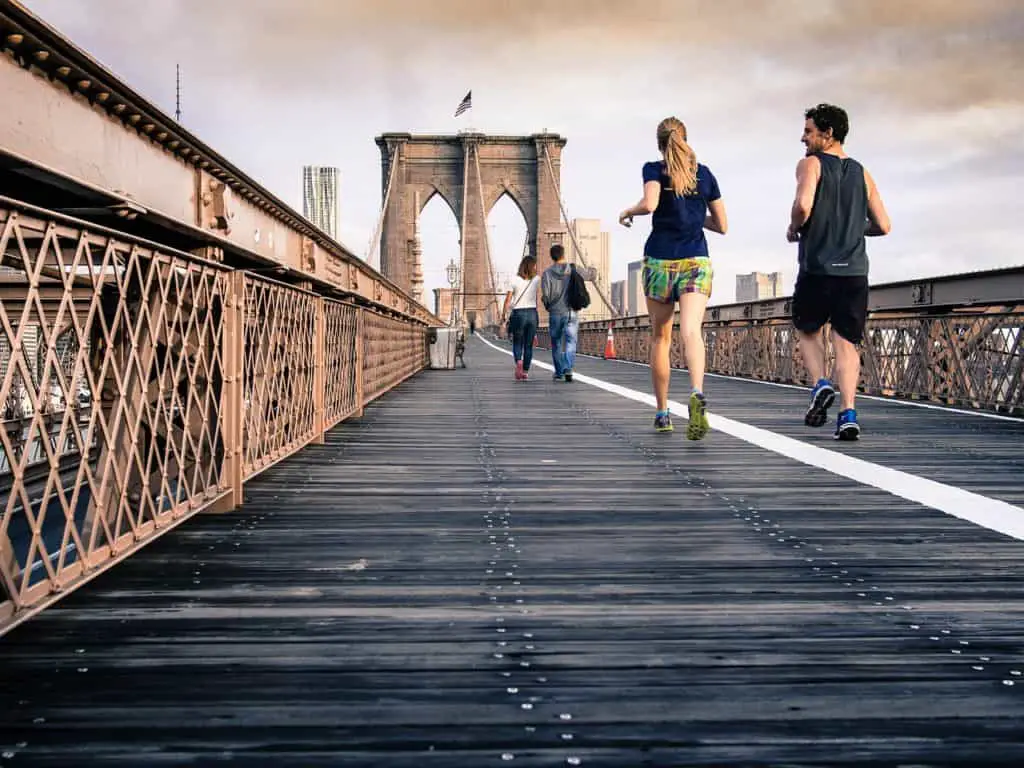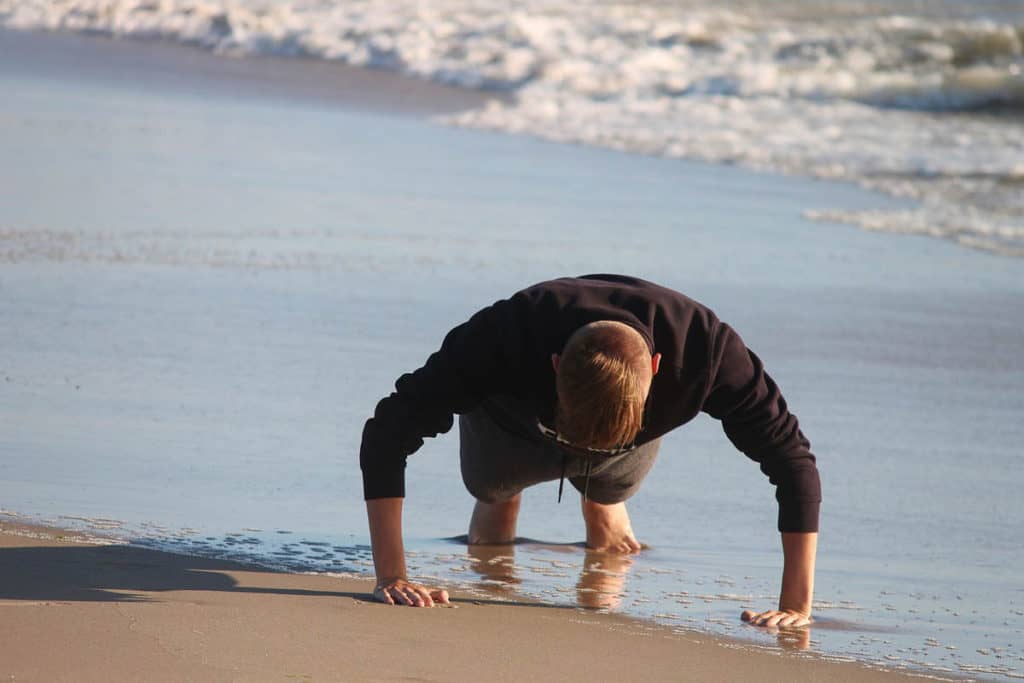When most people think about Karate, the first thought that comes into their head is fighting.
I don’t blame you if fighting was your first thought, but Karate can help improve your health and fitness as well as your emotional wellbeing.
Partaking in regular karate classes will help with:
- Stamina
- Cardiovascular fitness
- Agility
- Strength
- Flexibility
- Weight lose
- Mental health
Karate is not just for young people, the karate club I am a member of has people of all ages, and we all take it at our own pace.
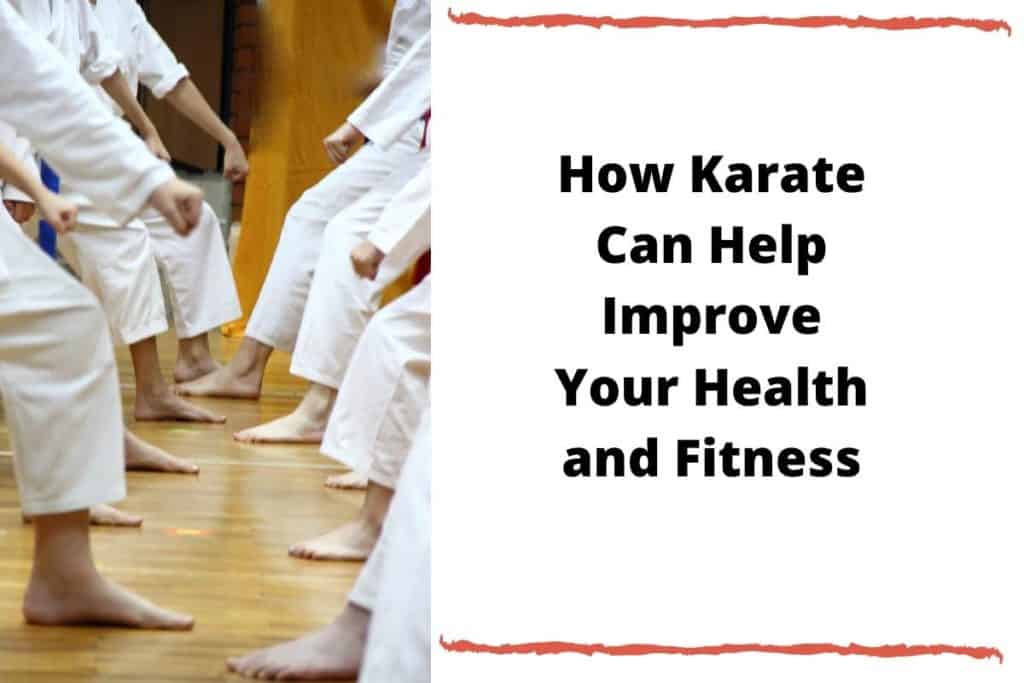
Karate Helps Improve Stamina
Karate is a great way to improve your stamina as you will be performing various techniques
- Kicking
- Punching
- Blocking
- Holding stances
Typically you will be performing these techniques by repetition over and over again to be able to perfect each movement. And the essential lesson to learn is breathing, control your breathing, and not to hold your breath.
Eventually, these movements will be combined together to be performed as a kata, with the first kata (Kion Kata) having 20 moves with the advanced kata Kankui dia having 65 moves.
Believe me, if you hold your breath or are unable to control your breathing, you will lose your stamina and might pass out.
When you keep practicing these techniques and katas, you will learn to control your breathing, and your stamina will improve.
You could notice an improvement after just a few weeks of training
Karate Helps Improve Cardiovascular fitness
Without a doubt, a good karate training session will get your heart pumping, as the session will last for a minimum of an hour. The session will start with a warm-up and finishing with a cool down at the end.
Karate is a full-body workout working all the major muscle groups. Your legs will be one of the most used muscle groups as you will spend most of the session in stances. As you progress, you will learn to work your core, too, as a lot of control of the movements comes from your core strength.
Throughout the lesson, you will constantly be moving and performing various techniques which will keep your heart rate up.
It’s recommended to get 150 minutes of heart-pumping aerobic exercise per week, and a couple of karate lessons a week will help towards this goal.
Karate Helps Improve Agility
Being agile and light-footed is a key component in Karate as you will be required to move in any direction quickly.
You might have to move out of the way for an attack or move quickly to attack someone before they can block or move out of the way of your attack.
Again, performing the moves and techniques by repetition will train your muscles on what to do, and your muscles will remember how to perform the movement.
What this leads to is muscle memory, and your body will be able to move quicker than you can think about moving. Try not to overthink what you’re doing and let your body do the work for you. It’s a great feeling when this happens.
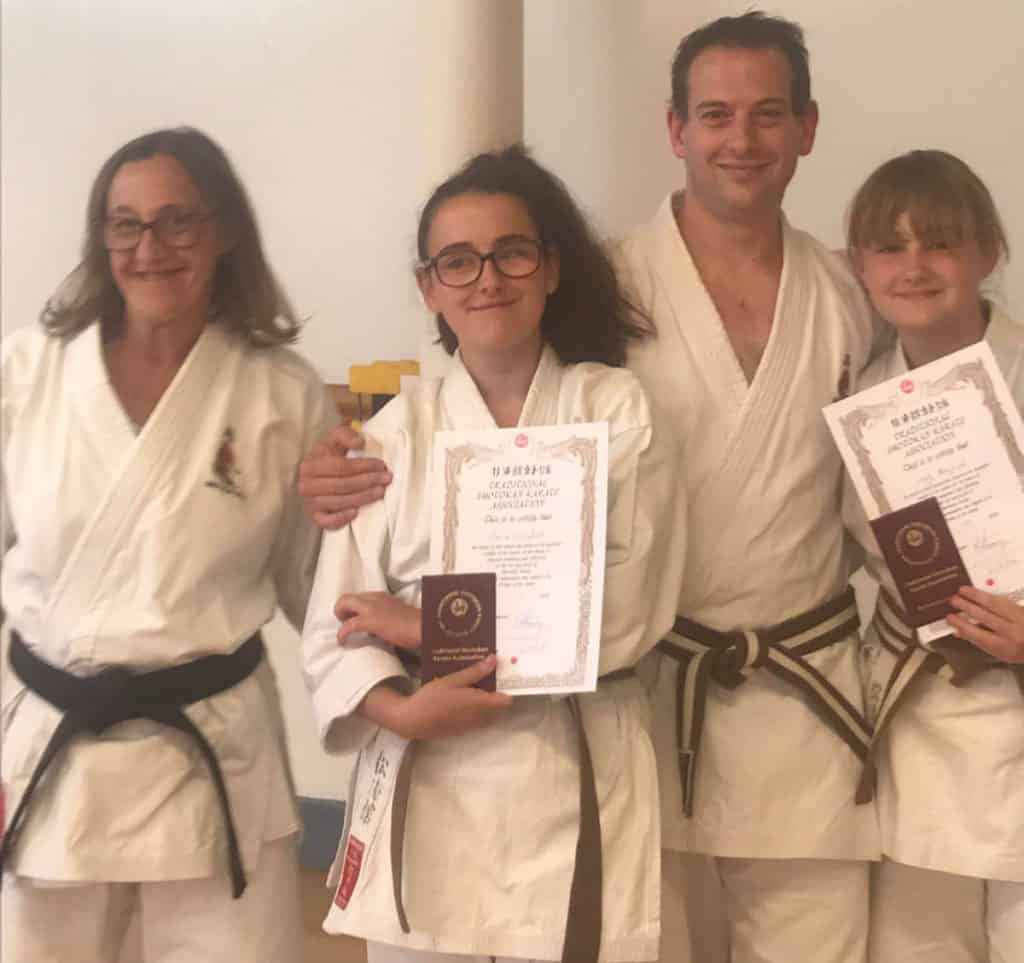
Karate Helps Improve Strength
During the warm-up part of the lesson, you might find yourself doing squats, push-up, crunches, and planks. All of these exercises are a great way of building your strength.
You will find that the warm-up will have a lot of core strength exercises as your core is used to create a stable foundation and help deliver more power to your punches and kicks.
In our karate sessions, we place a lot of focus on hips and how to use your hips to throw a stronger punch. I find having a strong core helps engage my hips.
I practice Shotokan karate which focuses on low stances. We can find ourselves having to hold a stance for a few minutes whilst the instructor is explaining something to us, or we’re performing techniques.
I know a few minutes does not sound long, but it’s not easy. Maintaining these stances is excellent for building strength in your legs.
As Karate is an all-over workout, you will notice your strength increasing over time and daily physical chores becoming easier.
Karate Helps Improve Flexibility
If you’re like me and never had much flexibility to begin with, or lost it as you got older, Karate involves a lot of stretching.
A good warm-up should include stretches and even assisted stretches. Assisted stretches are where your training partner will help you push yourself a little bit more. Assisted stretches are performed in a controlled manner.
Improving your flexibility will help with the various Karate techniques, especially when it comes to the kicks.
You will notice as you become flexible, your posture will start to improve as your muscles begin to loosen and you become more relaxed.
Before starting Karate, I used to have what is called 10 to 2 feet. 10 to 2 feet is where your feet point out to the side. See the picture below.
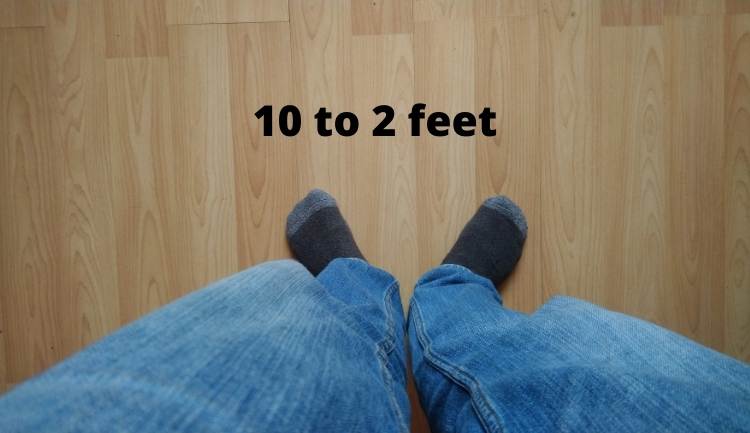
As I started to get some flexibility, my feet began to realign and point straight forward. Also, my left hip used to pop a lot, but this has stopped happening as well as we perform hip opening exercises which allow us to perform kicks better.
Karate Helps In Weight Loss
If you’re looking to lose weight, tone up, and get healthy and have fun simultaneously, you can not go wrong with Karate.
As I’ve mentioned already, Karate is an all-over body workout, and depending on the intensity, your could burn between 500 – 1000 calories per session.
To lose a pound of fat a week, you need to be in a 500 calorie deficit a day. You can achieve this by burning 500 calories through exercise, reducing your calories by 500, or combining both.
I’ve got a handy calorie calculator which will assist you in figuring out how many calories you should be consuming.
But remember, you cannot out-exercise a poor diet. You need to make sure you’re following a healthy balanced diet.
I’ve had many people tell me they are a lot lighter and slimmer since starting Karte, and some of them have even shown me their before pictures.
Karate is an excellent way of losing weight because you don’t feel like you’re exercising; you’re learning a new skill, having fun, and making new friends.
Karate Helps With Mental Health
These days we find our lives are becoming more stressful, anxiety starts to creep in as we’re constantly bombarded with bad news through social media. It all starts to take a toll on our lives.
Many studies have shown how exercise is an excellent way of relieving stress by releasing endorphins, and Karate is no exception.
Karate not only provides you with exercise but also with learning to control you’re breathing, so you don’t pass out from holding your breath. You will find yourself relaxing.
There is a lot to learn in Karate, and you’re always learning you will be keeping your mind active.
You will find that as you get into your karate journey, your confidence will grow, and you will be able to control and manage stressful situations
I Asked The Sensei How Karate Can Help Improve Your Health and Fitness
I wanted to get as much information as possible, so I asked my Sensi to help answer the below questions
Bill Gorthy 8th Dan
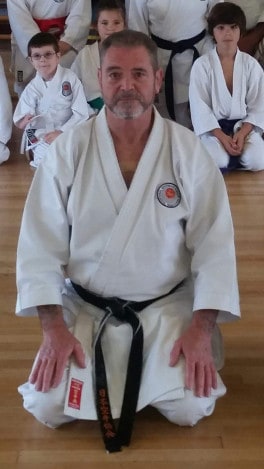
Bill Gorthy Jersey Shotokan Karate club profile.
Some people would think Karate is a young person’s activity; what’re your thoughts
Unlike other sports, the pursuit of Karate is a lifelong journey for everyone of any sex and age from as young as 5yrs old to 80yrs and beyond.
As we get older and our bodies change, we can still keep ourselves reasonably fit, active, and mentally switched on. There is no limit, hence the term “Karate is for everyone of all ages.”
How do you think Karate helps with cardiovascular fitness?
Cardiovascular exercise plays a very important part in Karate, as with all other martial arts.
The heart is a vital organ to our well-being
and we have a duty to ourselves to keep it in as best condition as possible, even as we get older we must still try to keep up some cardiovascular exercise but within our limit.
Hence another term, “some exercise is better than none.”
How do you think Karate helps physical fitness?
When practicing Karate, we make use of all parts of the body from stretching & flexibility, muscle toning, cardiovascular, speed, and agility, etc… the list goes on and on
How do you think Karate helps with mental health well-being?
Karate is an excellent way of relieving anxiety, stress, and general well-being after a hard day at work.
It also contributes to making children gain confidence in themselves and improves their academic abilities through their school work; I have often been told this by parents, who have noticed this.
What recommendations would you give to an older person starting their Karate journey?
As I’ve said before, there is no age limit in Karate, but I would certainly highly recommend Karate for the older person.
We are all unique and different, but the benefits that Karate can bring as we get older can improve so much in us all.
The body is like a car engine, keep it serviced and maintained regularly, and it will last a lot longer than a car that is neglected.
Ray Dubras 4th Dan
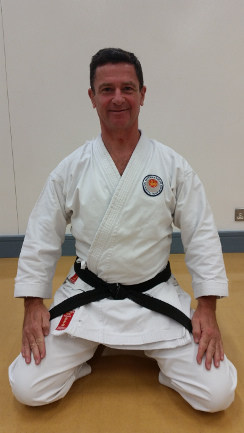
Ray Dubras Jersey Shotokan Karate club profile.
Some people would think Karate is a young person’s activity; what’re your thoughts
This all depends on your ultimate goals, objectives, and motivation for doing Karate. If your objective is to train for high-level competition (Olympics or at international levels) then like most sports athletes there is an age barrier to overcome, this is normally around the early to mid-30s. This is where younger karateka has the advantage in agility, speed of mind, and body.
If your objectives and motivation are more to do with staying fit or for the ability to defend yourself, then there is no age limit. The style and regularity of training create higher than normal physical activity, maintaining suppleness, and muscle conditioning.
Along with other sports, taking part in Karate also brings other benefits to mental health and social needs. Normally most karate club training is carried out in group sessions and done in a friendly, supportive and safe learning environment.
How do you think Karate helps with cardiovascular fitness?
For sport-style training where competition fights happen over 3 to 5 minutes rounds, the level of fitness and endurance needs to be higher than those training within a normal club environment. When and if selected for national or international competition, the karateka would normally be working with coaches who will be demanding a very high level of endurance and the training will be supplemented with long runs and gym work training.
For normal club training, the karateka needs to be able to maintain 60 to 120 minutes of moderate activity. This done two to four times a week promotes a reasonable level of cardio fitness.
How do you think Karate helps physical fitness?
As noted above those doing the high levels of competition benefit from additional training and therefore physical fitness tends to be higher than normal club training provides for the karateka.
When training in the club, stretching and fitness exercises are done as part of the warm-up and cool-down activity to prepare the karateka for the main activity.
The training style and activity promote the use of all parts of the body from the core to limbs. This maintains and improves the normal range of motion as well as using all the body muscles to develop balance and muscular speed and power. Generally, strength is not a high consideration as karate training promotes technique over strength.
How do you think Karate helps with mental health well-being?
Fulfilling your own goals and objectives is a very satisfying and rewarding endeavor. The sense of achievement brings mental benefits. The grading and belt system shows the karateka’s progression and achievements from their training.
Training is generally done in small to medium-sized friendly groups which encourages more participation in the activity. This then promotes social interaction and other events outside the training hall (dojo). People are social and being isolated and lonely is not good for anyone. Karate training brings people together which promotes a sense of belonging and teamwork.
Whilst training a high level of mental alertness is needed, this means that the karateka needs to break away from the issues and problems of everyday life for the time they are training. This then promotes mental calmness and rebalancing the mind.
What recommendations would you give to an older person starting their Karate journey?
Find your why. Why would you benefit from a group training activity overdoing exercise by yourself? What do you want to get out of the sport; fitness, social interaction, and general improvement in both physical and mental state. Or potential learn something that may be useful – to defend yourself.
If you are over 35, high-level competition should not be your focus leave that to the youngsters who started before the age of 18.
Daniella Cranfield 3rd Dan
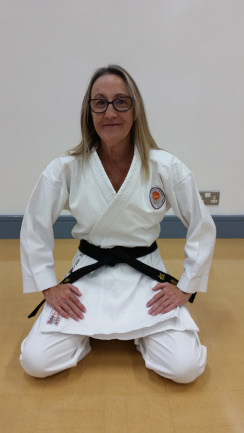
Daniella Cranfield Jersey Shotokan Karate club profile.
Daniella has written an article for this site Is Traditional Shotokan Karate Relevant In Today’s Society?
Some people would think Karate is a young person’s activity, what’s your thoughts
Whilst a younger practitioner will have naturally have more speed, stamina, and flexibility than an older person, this doesn’t mean that an older person can’t learn and enjoy Karate. Indeed, Karate is all about respect, discipline, and technique. Speed, stamina, and flexibility will increase the more effort you put into your training, no matter what age you are.
These advances may be more evident sooner in a younger person, however, an older person will also notice an increase the more that they train. I would definitely say that Karate can be taken up by older people and will have a positive impact on them. Their fitness levels will increase as well as balance and confidence.
How do you think Karate helps with cardiovascular fitness?
Regular exercise is always a good way to improve cardiovascular fitness. Karate training usually lasts around an hour a few times a week. Attending classes at least twice a week will help improve cardiovascular fitness. Normal classes include a warm-up and a cool-down session. As well as this Karate uses the whole body. You are moving around almost constantly using your arms, legs, and core muscles.
How do you think Karate helps physical fitness?
In Karate you use your entire body. Shotokan Karate encourages long stances, building your leg muscles. Your arms are constantly used to strike or block, so you’re working your arm and shoulder muscles. Your core is worked as Karate concentrates on using correct breathing techniques and engaging your core muscles, especially in turning and striking. In Karate your whole body is worked and all the major muscle groups are used. This results in a full-body workout.
How do you think Karate helps with mental health well-being?
As Karate is very much technique focused you tend to concentrate on the move that you are performing. There is no room for other unrelated thoughts as you are training. For me, Karate is very much like active meditation, I only think about the move/technique I am performing. It is a welcome break from everyday stresses and worries.
I am working my body and clearing my mind, leaving me both tired and refreshed at the same time! As well as this aspect, a good karate club is filled with like-minded people there because they are interested in learning Karate. This creates a feeling of belonging among the karateka, and it is always positive to feel like you belong to something bigger than yourself. A lot of karate clubs are also quite social, and engaging with other like-minded people is very good for a person well being.
Another positive with Karate is the grading process. When students progress to another belt they have a sense of achievement, which gives them the confidence to keep going and encourages them to learn more. Creating a positive cycle of learning, training, and achieving.
What recommendations would you give to an older person starting their Karate journey?
For an older person starting Karate, I would say listen to your body and what it’s telling you. It’s very easy to get caught up in the training and push yourself further than your body is ready to go and injure yourself. Take it slow and steady and try not to rush. Never compare yourself to anyone else in the dojo. You only have to be better than yourself at your last training session. Karate is a journey, go at your own pace and just enjoy it.
Conclusion
Going on just my experience alone, Karate can help improve your health and fitness and mental well-being.
I’ve found that it has helped with my:
- Flexibility
- Posture
- Stamina
- And helps me relax and unwind
Hopefully, you now have a better understanding of why Karate is more than just learning to fight or defend yourself and how Karate can help improve your health and fitness.
You will find there are many styles of Karate and clubs to chose from. I recommend you research your local clubs by speaking to people and attending a few classes.
A good Karate club will offer free training sessions to see if the club and style are suitable for you.
Don’t push yourself too hard when you start; take your time and allow your body to adjust to the training.
After the first few weeks of training, you will start to notice the improvements in your health and fitness.
Karate can be very social, not only when you’re training in the Dojo but also outside of the Dojo. You make new friends, go out to social gatherings and team events.
The karate club members become an extended family. With that in mind, all I would like to say is welcome to the Karate family.
